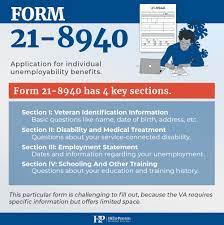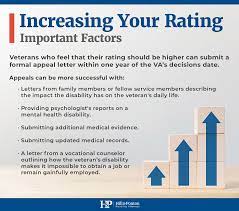Understanding Individual Unemployability (IU) Benefits from the VA
Individual Unemployability (IU) is a benefit provided by the Department of Veterans Affairs (VA) for veterans who are unable to secure and maintain substantially gainful employment due to service-connected disabilities. This benefit allows eligible veterans to receive compensation at the 100% disability rate, even if their service-connected disabilities are not rated at that level.
To qualify for IU benefits, veterans must meet certain criteria set by the VA. This includes having a service-connected disability or disabilities rated at a certain level that prevent them from working. Veterans must also provide evidence of their inability to secure and maintain substantial gainful employment due to their service-connected disabilities.
The VA considers various factors when determining eligibility for IU benefits, such as the severity of the veteran’s disabilities, their work history, education level, and other relevant factors. It is important for veterans seeking IU benefits to provide thorough documentation and evidence to support their claim.
Once approved for IU benefits, veterans will receive compensation at the 100% disability rate. This can provide much-needed financial support for veterans who are unable to work due to their service-connected disabilities. Additionally, veterans receiving IU benefits may also be eligible for other VA programs and services.
It is essential for veterans who believe they may qualify for IU benefits to reach out to the VA for assistance. The application process can be complex, but with proper documentation and support, eligible veterans can access the benefits they deserve. The VA is committed to helping veterans with service-connected disabilities achieve financial stability through programs like Individual Unemployability.
Understanding VA Individual Unemployability: Key Questions Answered
- What is Individual Unemployability (IU) benefits from the VA?
- Who is eligible for Individual Unemployability benefits?
- How do I apply for Individual Unemployability benefits?
- What evidence do I need to support my claim for IU benefits?
- Can I work while receiving Individual Unemployability benefits?
- Is there a difference between IU benefits and a 100% disability rating?
- Are there other VA programs or services available to veterans receiving IU benefits?
What is Individual Unemployability (IU) benefits from the VA?
Individual Unemployability (IU) benefits from the VA are a form of compensation provided to eligible veterans who are unable to secure and maintain substantially gainful employment due to service-connected disabilities. This benefit allows veterans to receive compensation at the 100% disability rate, even if their service-connected disabilities are not individually rated at that level. IU benefits aim to provide financial support to veterans who are unable to work due to their service-connected disabilities, ensuring they receive the assistance they need for their well-being and livelihood.
Who is eligible for Individual Unemployability benefits?
Individual Unemployability (IU) benefits from the VA are available to veterans who have service-connected disabilities that prevent them from securing and maintaining substantially gainful employment. To be eligible for IU benefits, veterans must have a disability or disabilities that are rated at a certain level by the VA. Additionally, veterans must provide evidence demonstrating their inability to work due to their service-connected disabilities. Factors such as the severity of the disabilities, work history, and education level are considered in determining eligibility for IU benefits. It is important for veterans seeking IU benefits to carefully review the VA’s criteria and provide thorough documentation to support their claim for consideration.
How do I apply for Individual Unemployability benefits?
To apply for Individual Unemployability benefits from the VA, eligible veterans must submit a formal application to the Department of Veterans Affairs. The application process typically involves providing detailed information about their service-connected disabilities, work history, education level, and any other relevant factors that support their claim for IU benefits. It is crucial for veterans to gather and submit thorough documentation to demonstrate their inability to secure and maintain substantially gainful employment due to their service-connected disabilities. Seeking assistance from a veterans’ service organization or a VA-accredited representative can also be beneficial in navigating the application process for Individual Unemployability benefits.
What evidence do I need to support my claim for IU benefits?
To support your claim for Individual Unemployability (IU) benefits from the VA, you will need to provide evidence that demonstrates the severity of your service-connected disabilities and how they impact your ability to secure and maintain substantially gainful employment. This evidence may include medical records, treatment notes, physician statements, vocational assessments, employment history, education level, and any other relevant documentation that shows the extent of your disabilities and their effect on your ability to work. It is crucial to gather comprehensive and detailed evidence to strengthen your claim for IU benefits and increase the likelihood of approval.
Can I work while receiving Individual Unemployability benefits?
Many veterans wonder if they can work while receiving Individual Unemployability (IU) benefits from the VA. The short answer is that IU benefits are designed for veterans who are unable to secure and maintain substantially gainful employment due to their service-connected disabilities. If a veteran is able to work and earn a substantial income, they may no longer meet the eligibility criteria for IU benefits. However, there are certain exceptions and guidelines that allow veterans to engage in limited forms of employment while still receiving IU benefits. It is important for veterans to understand these rules and regulations to ensure compliance with VA guidelines while maximizing their financial stability.
Is there a difference between IU benefits and a 100% disability rating?
Yes, there is a difference between Individual Unemployability (IU) benefits and a 100% disability rating from the VA. While both may result in receiving compensation at the 100% disability rate, the key distinction lies in how the benefits are awarded. A 100% disability rating is given when a veteran’s service-connected disabilities are rated at 100%, indicating a high level of impairment. On the other hand, IU benefits are granted when a veteran is unable to secure and maintain substantially gainful employment due to their service-connected disabilities, even if their disabilities are not individually rated at 100%. IU benefits provide financial support to veterans who are unable to work due to their disabilities, offering them compensation at the 100% disability rate without requiring each individual disability to be rated at that level.
Are there other VA programs or services available to veterans receiving IU benefits?
Veterans receiving Individual Unemployability (IU) benefits may also be eligible for other VA programs and services. In addition to the financial support provided through IU benefits, veterans may have access to a range of resources aimed at supporting their overall well-being. These programs could include vocational rehabilitation, education and training assistance, healthcare services, mental health support, housing assistance, and more. The VA is committed to providing comprehensive care and assistance to veterans with service-connected disabilities, ensuring that they have access to the resources they need to thrive despite their challenges.




